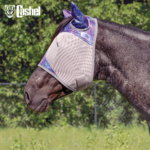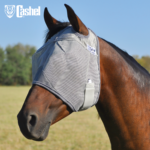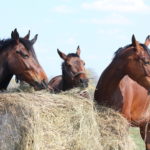
Pregnant mares are in fact “eating for two,” as they say. Your mare has her own feed requirements, but then you must add to that the requirements for the foal she has on board. Foals in utero have extremely high energy, protein, and mineral needs because of their rapid growth. But it’s not just about feeding more quantity when you have a pregnant mare. You want to make sure she gets what she needs so she can provide for the fetus, as well.
Your Mare’s Requirements
The difference in your mare’s nutritional requirements between the first and third trimesters in her pregnancy is tremendous (see the chart on page 26). Unfortunately, just when she needs these nutrients the most, your mare’s appetite is likely to be the poorest because of the large amount of space the fetal foal takes up in the abdomen.
A large amount of information is available concerning calorie, protein, calcium, and phosphorus requirements for pregnant mares. Note that the calorie requirements for a pregnant mare are 28% higher, protein is 42% higher, and calcium/phosphorus are 80% higher. This means that if your mare’s non-pregnant diet is adequate and all you do is feed her 28% more volume to keep her weight good, you will be short-changing both the mare and her foal on protein and minerals. Even if that isn’t the case, just feeding more in late pregnancy is not a good strategy because pregnant mares are notoriously picky, may even be colicky, and frequently go off feed just when their nutrient needs are the highest.
If your mare isn’t taking in enough calories to meet the combined needs of mare and foal, her body will get the calories, protein, and minerals it needs by taking them from her own tissues-from her fat stores, her muscles, and her own bones and other body tissues. Since her nutrient needs are going to skyrocket again after she foals and starts producing milk, this isn’t a good situation. It’s also not a foolproof solution for the foal still growing inside your mare. If mama has nutritional deficiencies, she won’t be able to meet the baby’s needs either. If her levels are border-line, she could end up deficient by providing for the foal. This can have long-term health consequences for your mare.
Approximately 80% of the fetal foal’s growth is completed in the last trimester of your mare’s pregnancy. This is when her requirements really begin to increase, and then they are at the highest during the first three months after foaling, when she’s lactating heavily. Your mare’s requirements are even higher when she’s producing milk than when she’s pregnant.
The Solution
Meeting your pregnant mare’s needs doesn’t have to be expensive or involve a pricey feed switch. To encourage good digestive health and keep your mare happily munching away on small meals all day long, her diet should be based on grass hay with little, if any, grain. If you buy your hay in large quantities, have its nutritional components analyzed. If you buy smaller quantities from local sources, work with a veterinary nutritionist who will know what deficiencies are common in your area. Then, based on this information, you can feed your mare a supplement that meets the specific needs of your area so that this basic diet is balanced and adequate to meet her pregnancy needs.
There are a variety of high-protein and balanced-mineral supplements on the market that will effectively provide your mare with what she needs. If her basic diet has been correctly balanced, you can use these with confidence. Look for a balanced mineral supplement with 30% protein, at least 4% calcium, and 3% phosphorus. Copper should be 250 to 300 ppm, zinc approximately three times higher.
Starting at six months of pregnancy, feed your mare ½ pound per day in addition to whatever supplements her early pregnancy diet needed. At nine months, increase her to a full pound.
Everyone gets confused about protein, thinking in terms of percentages rather than actual amount, and forgetting about calories. Even an average-quality hay will typically have at least 7% protein. Feeding your girl a 14% “mare” feed might sound like a good way to boost protein, but-pound for pound-that grain has about three times more calories than a pound of hay. If you substitute calorie per calorie to avoid having your mare get fat, she will actually get less protein than if you had let her have the three pounds of hay.
When lactating, your mare must eat considerably more of her base diet to hold her weight. In reality, most mares won’t eat 70% more food, so you’ll need to increase her supplements accordingly. Even mares who are easy keepers-so they can’t be fed as much-will often come up short.
As you put your plans for your pregnant mare together, any questions generally can be answered by your veterinarian or a veterinary nutritionist. Relax, and enjoy watching your mare make ready for baby!






